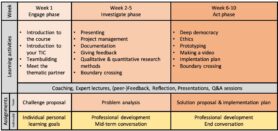Program
The TIC course was a 10-week course with scheduled meetings on Monday mornings, Wednesdays and Fridays. For lifelong learners, the TIC course was scheduled on Friday afternoons as well as some Wednesdays for presentations.
To navigate the TIC process, participants were placed within a team of 4-5 other students and lifelong learners working together on a specific societal problem. The TIC course incorporated a variety of different learning components including workshops, expert lectures, scientific and societal research, group work as well as reflection and personal development opportunities, amongst others.
The team-track of this course (60% of the final grade) was divided into three phases, based on challenge-based learning:
- Engage: move from big idea to challenge (week 1)
We start with a broad concept that can be explored in multiple ways; this is the big idea. The next step is narrowing down the big idea and personalizing it, by asking personal and contextual essential questions. The last step is turning the chosen essential question into a call for action, making it an immediate, actionable, and exciting challenge. - Investigate: look at the challenge from different perspectives (weeks 2-5)
In this phase, you will conduct content- and concept-based research to create a foundation for actionable and sustainable solutions. - Act: develop and test solutions (week 6-10)
In this last phase, you will develop grounded solutions and implement them in authentic settings, receive and handle feedback, and learn from successes and failures.
Since personal development was an important component of the course, participants were guided through the process of personal and professional reflection throughout the course, alongside their group’s research into a solution to the societal problem. During the course, participants reviewed their own strengths and weaknesses regarding interdisciplinary and cross-level collaboration and their ability to connect science and society. Additionally, participants were asked to review what they bring to the group in relation to others as well as evaluate their personal and professional growth. This individual-track was 40% of the final grade.




